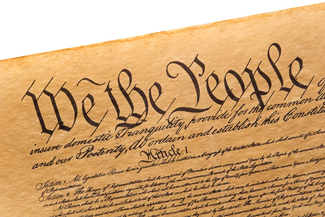Does Constitution allow ban on birthright citizenship?

Image from Shutterstock.
Republican presidential candidate Donald Trump’s call for a ban on birthright citizenship is drawing attention to the 14th Amendment and an 1898 Supreme Court case.
The 14th Amendment, passed to ensure freed slaves became American citizens, reads: “All persons born or naturalized in the United States, and subject to the jurisdiction thereof, are citizens of the United States and of the state wherein they reside.”
Most legal scholars agree the 14th Amendment grants birthright citizenship to anyone born on U.S. soil, report NBC News, the Washington Post, CBS News and CNN. A few, however, say the amendment is open to interpretation because of this phrase: “and subject to the jurisdiction thereof.”
The jurisdiction reference was intended to apply to American-born children of Native Americans, whose reservations were considered sovereign entities, and foreign diplomats and soldiers, Yale law professor Peter Schuck writes in an August 2010 New York Times op-ed. At the time the amendment passed in 1868, no one was in the United States illegally because federal law didn’t limit immigration. Citizenship at the time was viewed as a mutual relationship.
The argument against birthright citizenship is that a parent who comes into the country illegally isn’t subject to the full jurisdiction in a country built on the idea of mutual consent, Schuck explained. (His op-ed suggests conditioning birthright citizenship on additional ties to the country, such as attaining a number of years of education in American schools.)
Another hurdle to repealing birthright citizenship is an 1898 U.S. Supreme Court decision involving a man who was born here to Chinese parents residing in the United States. The court said the 14th Amendment made the man, Wong Kim Ark, a U.S. citizen. The Supreme Court addressed the issue again in a footnote in a 1982 case suggesting the 14th Amendment applied to the children of people living in the United States illegally.
Among those who think the 14th Amendment doesn’t mandate birthright citizenship is California State University at San Bernardino professor Edward Erler. “In reality, birthright citizenship is incompatible not only with the text of the citizenship clause but, more fundamentally, with the principle of consent—one of the bedrocks of republican government,” he told NBC News.



